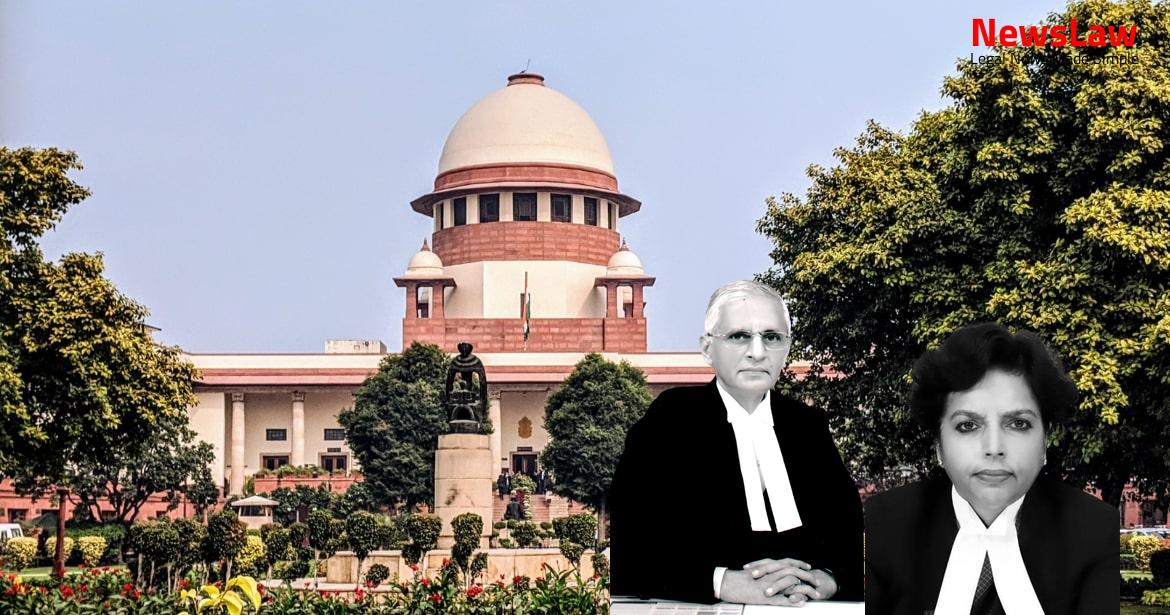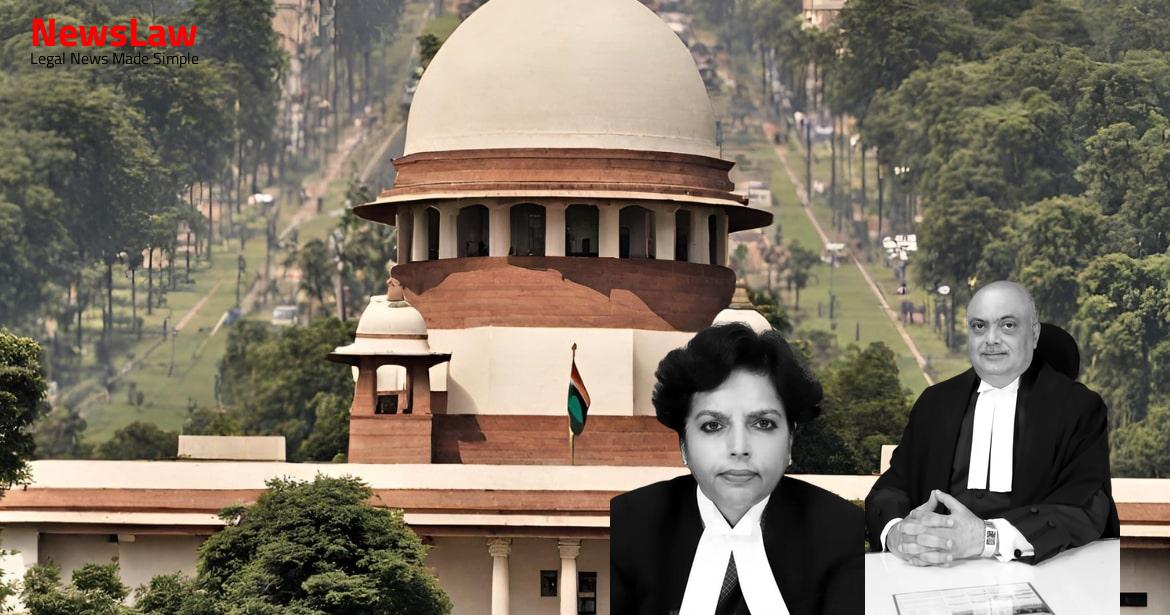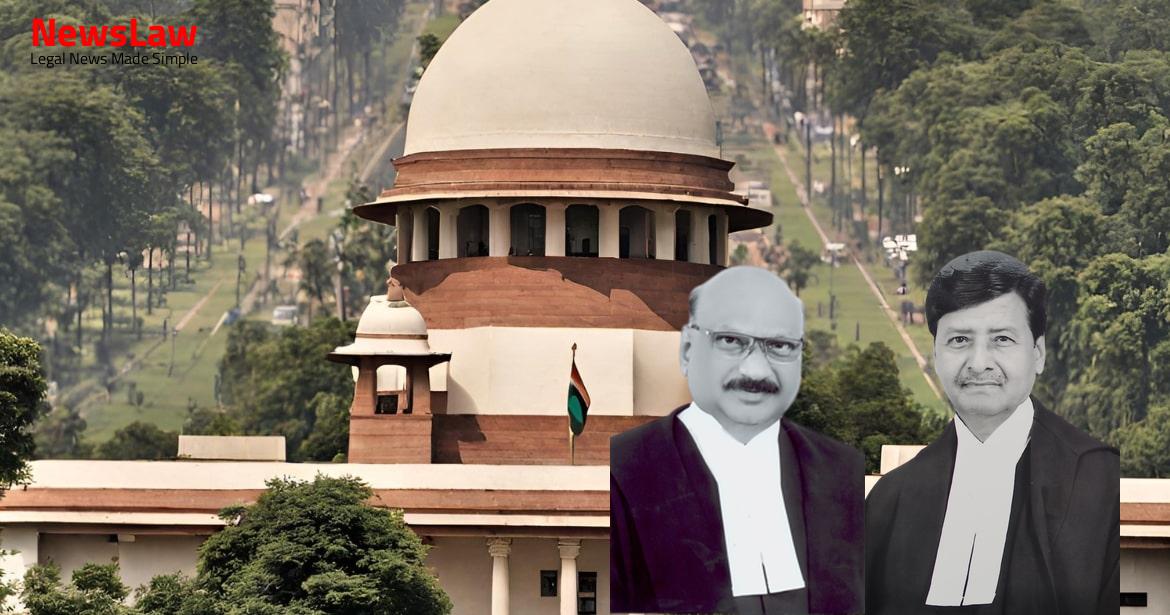Delve into a nuanced legal analysis of a disputed plot allotment in a commercial complex as per a recent court judgment. The judgment emphasizes the significance of approaching legal matters with clear documentation and clean intentions, underscoring the need for transparency and evidence in legal disputes. The court’s scrutiny on town planning principles and vested interests provides valuable insights into resolving complex legal matters effectively.
Facts
- Respondent filed a writ petition against the order dated 24.04.2010 in W.P.No.212/2006 regarding the allotment of plots.
- Appeal related to plots allotted in C.A.No.11015 and 11016/2017 challenged the order of the High Court of Judicature, Andhra Pradesh at Hyderabad.
- Layout plan indicated plot reserved as a parking area, leading to grievance about the allotment to defendant No.2.
- Panchayat merged into Municipal Corporation Kadapa, now with jurisdiction over the area.
- 625 members were allotted plots in the land where a layout was formed.
- Consideration limited to plot measuring 3.2 cents allotted to respondent No.1 in C.A. No.11015/2017.
- Certain parties were deleted from the cause title due to amendments, parties referred to in original proceedings’ rank.
- Appellants aggrieved by the High Court’s order.
- Plaintiffs No.4 and 5, not members, wanted to purchase the plot allotted to defendant No.2 for parking area in front of their shops.
- Divisional Co-operative Officer termed the disputed plot as a parking area, award passed in favor of plaintiffs.
- Defendants, particularly respondent (Mr. M.V. Ramana), appealed to the Andhra Pradesh Co-operative Tribunal, which upheld the award.
- Respondents No.4, 6, and 7 in W.P. No.6212/2006 are now before the court in this appeal.
- Government allotted land for layout formation in Sy.No.752/2 and 91/1, Kondayapalli Tank bund to N.G.O. Co-operative Building Society Ltd.
- Layout included areas designated for parks, playgrounds, schools, religious places, shopping areas, and parking places.
- High Court set aside the award of Divisional Co-operative Officer and Co-operative Tribunal based on maintainability of the proceedings.
- The learned Division Bench of the High Court allowed the writ petition and quashed the award dated 28.01.2004
- The award was passed by the Divisional Co-operative Officer, Cuddapah acting as an Arbitrator under the APCS Act
- The award was originally affirmed by the Andhra Pradesh Co-operative Tribunal at Hyderabad through its judgment dated 27.02.2006
Also Read: Supreme Court Upholds Rejection of Plaint Under Order VII Rule 11 of CPC: A Critical Analysis
Analysis
- The judgment discusses the allotment of a plot to defendant No.2, Mr. M.V. Ramana, by the Society following the required procedures.
- The plaintiffs contested that the sale of the plot was illegal as it was part of an area earmarked for a playground.
- The vacant site in question was considered suitable for parking based on its location in a commercial complex.
- The plaintiffs, former office bearers of the Society, had conflicts of interest as they were also members of a welfare association involved in the dispute.
- The absence of General Body resolutions for certain years was noted, but not considered fatal to the case.
- The Society did not seek prior permission from Cooperative Officers for the sale to defendant No.2.
- The plaintiffs’ assertion that the vacant plot was meant for parking was questioned due to their previous attempts to secure the same plot for themselves.
- The judgment also mentions the importance of town planning principles requiring parking space in commercial areas.
- The judgment refers to previous related cases and defect sheets prepared by inspecting authorities.
- The plaintiffs’ challenge to the allotment to defendant No.2 was deemed non-bonafide due to their conflicting actions and interests.
- The Court emphasized the need for concrete evidence of the plot being reserved as a parking area in the layout plan, which was lacking in this case.
- The judgment highlights the significance of approaching the Court with clean hands and the need for clear documentation to support claims.
- The discussion touches upon the Society’s regularization of encroachments and previous allotments made to defendant No.2.
- The report from the Divisional Co-operative Officer played a critical role in the analysis of the case.
- The judgment questions the assumption that the vacant site was meant for parking, considering the parties involved and their vested interests.
- Disputes related to the constitution, management, or business of a society should be referred to the Registrar for decision.
- These disputes can arise among members, past members, persons claiming through members, or between members and the society.
- Claims for debt or other amounts due to a society, claims by surety against a principal debtor, and claims for possession of land or property can also be considered disputes.
- The Registrar will decide if a dispute falls under the categories specified for referral.
- Disputes relating to elections should be referred after the declaration of the election results.
- The Divisional Co-operative Officer fixed the price for allotment considering the market value.
- The allotment took place in the year 2000, and construction was subsequently carried out.
- Over twenty years have passed since the allotment and construction.
Also Read: Validity of Debt and Enforcement of Section 138 NI Act
Decision
- Intervention or action is not justified at this juncture
- Appeals are dismissed with no order as to costs
Also Read: Enlargement on Bail in Illegal Mining Case
Case Title: VELAGACHARLA JAYARAM REDDY Vs. M.VENKATA RAMANA & ORS.ETC. (2022 INSC 31)
Case Number: C.A. No.-011015-011016 / 2017



